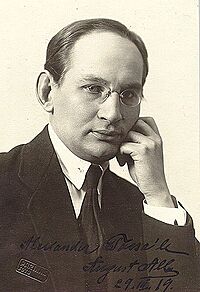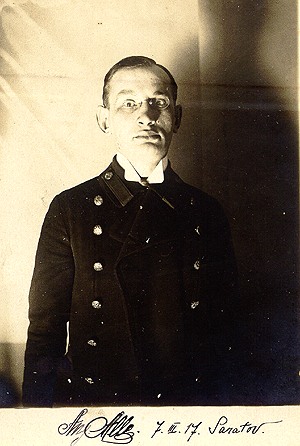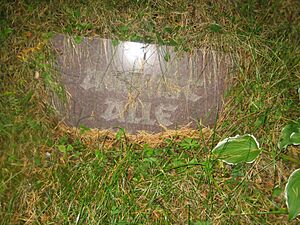August Alle facts for kids
Quick facts for kids
August Alle
|
|
|---|---|

August Alle in 1919.
|
|
| Born | 31 August 1890 Fellin, Governorate of Livonia, Russian Empire
|
| Died | 8 July 1952 (aged 61) Tallinn, Estonia
|
| Occupation | Writer, poet |
| Years active | 1915–1952 |
August Alle (born August 31, 1890 – died July 8, 1952) was an important Estonian writer and poet. He was known for his sharp and often humorous writing style.
Contents
August Alle's Early Life and Education
August Alle was born in Viljandi, Estonia. His father worked as a stonemason. August went to school in Viljandi and later in Narva.
He started studying pharmacy in 1915 but soon changed his mind. From 1915 to 1918, he studied medicine at the University of Saratov. Later, in 1922, he began studying law at the University of Tartu. He finished his law exams much later, in 1937. After that, he worked as a lawyer on his own.
Becoming a Writer and Poet
After his medical studies, August Alle worked as a journalist and gave lectures in Estonia. Eventually, he decided to focus completely on writing.
Around 1919, he became part of a group of writers called Siuru. August Alle was also well-known for writing newspaper columns and for being a literary critic. This means he would review and comment on other writers' works.
He became famous with his poetry collection called Carmina Barbata, published in 1921. His writing style was often bold and used humor, irony, and satire. Satire is a way of using humor to criticize people or ideas. He was very good at writing short, clever sayings called epigrams. His words were powerful and respected in Estonia. He often wrote about the new middle class that was growing between the two World Wars. His experiences from revolutionary Petrograd and Tartu after the Estonian War of Independence influenced his works.
August Alle's poems also spoke out strongly against certain political ideas that were becoming popular in Europe at that time.
August Alle's Later Work
After Estonia became part of the Soviet Union in 1940, August Alle took on new roles. He became an advisor for the Ministry of Education. He also led a special group that made lists of books to be removed from libraries.
August Alle was also a member of the board for the Estonian Writers' Union. He worked as an editor for different literary magazines. In 1942, he joined the Communist Party of Estonia. During a time when Germany invaded, he was in charge of the press department for the Communist Party.
From 1946 until he passed away, he was the chief editor of a very important literary magazine called Looming. This magazine means "creation" in Estonian.
One of August Alle's most famous poems is called Eesti pastoraal (Estonian pastoral).
Works
- Üksinduse saartele (1918)
- Carmina Barbata (1921)
- Laul kleidist helesinisest ja roosast seelikust (1925)
- Ummiklained (1930)
- Karmid rütmid (1934)
- Lilla elevant (1923)
- Epigrams (1944)



